Prestigious Payton Man of Year celebrates philanthropy, but NFL offers players little guidance
- Oops!Something went wrong.Please try again later.
- Oops!Something went wrong.Please try again later.
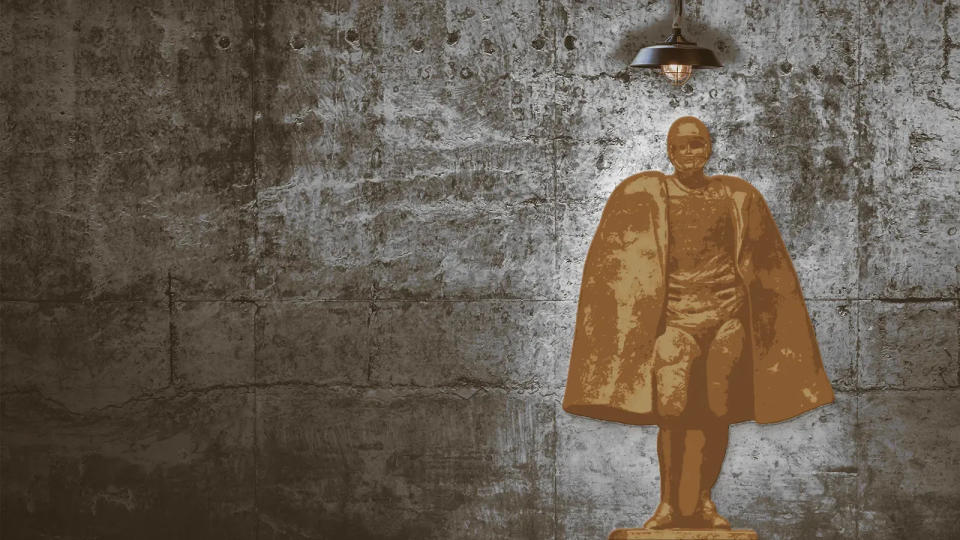
Baltimore Ravens defensive end Calais Campbell nearly called it a career before the 2020 NFL season, played in empty stadiums and under heavy restrictions because of the COVID-19 pandemic.
Campbell, a second-round draft pick by the Arizona Cardinals in 2008, told The USA TODAY Network he continued playing in part because he was named the 2019 Walter Payton NFL Man of the Year.
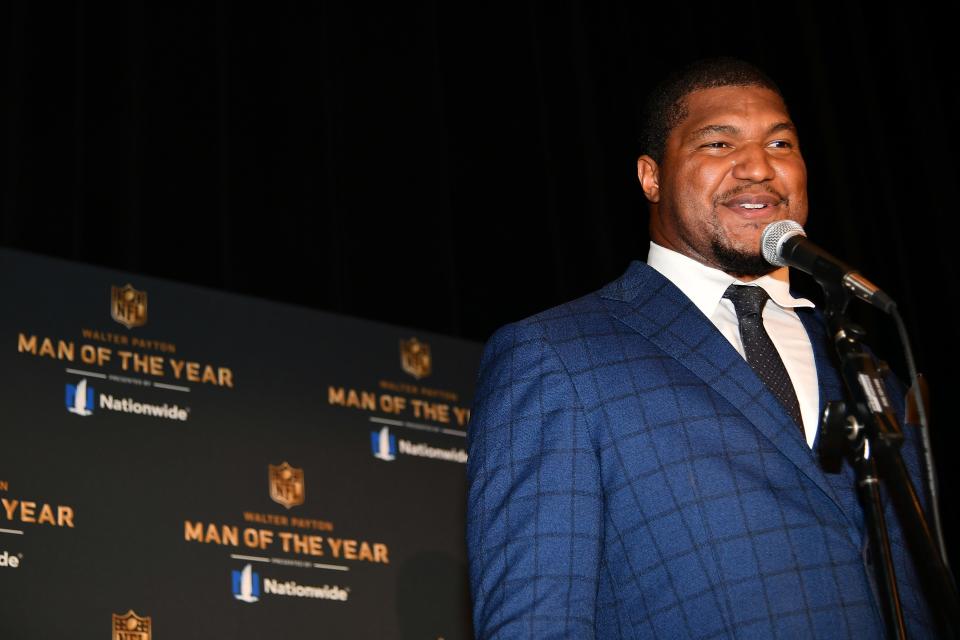
“I was contemplating retirement and thinking about whether I wanted to keep playing football or not,” Campbell told The USA TODAY Network. “I really didn’t know. And a part of me was like, ‘Man, you’ve got to at least play a season. You’ve got the patch on your jersey. Man, that’s something that very few people got to do.’ It was one of the motivational factors for me to come back and play a little bit more, which is kind of crazy to say, because I don’t think I’ve ever told anybody that before.”
The Walter Payton NFL Man of the Year award recognizes a player for excellence on and off the field, with an emphasis on community service and philanthropy, and is described by the league as its most prestigious honor. The winner receives the Gladiator statue — a gleaming bronze trophy of a football player wearing a cape — a special patch to wear on his jersey for the rest of his career and a $250,000 donation to his charity of choice from the NFL Foundation and corporate sponsor Nationwide.
The 2022 Payton award winner will be announced at the NFL Honors awards show on Thursday night at Symphony Hall in Phoenix. The event is hosted by Kelly Clarkson and will broadcast live on NBC, NFL Network and Peacock.
The accolade was first bestowed on Green Bay Packers quarterback Bart Starr during the 1969 season when it was known as the Gladiator Award, then presented to Baltimore Colts quarterback Johnny Unitas during the 1970 season, when it was renamed NFL Man of the Year. Payton received the award during the 1977 season, and it was renamed in honor of the Hall of Fame Chicago Bears running back after his death in 1999.
“It shows who you are outside of football,” said Anquan Boldin, the 2015 Walter Payton NFL Man of the Year, who played for the Arizona Cardinals for seven of his 14 seasons in the league. “It shows the character that you have, the morals, the principles that you live by, and I think that’s why that award is so coveted. It’s something that guys look forward to, especially with the way that it’s being promoted now.”
All 32 NFL teams nominate a player for the Walter Payton NFL Man of the Year award based on his significant positive impact on the community — the men who represent “the best of the NFL’s commitment to philanthropy and community impact,” according to the NFL’s website.
But a six-month investigation by The USA TODAY Network into how pro athletes engage in philanthropy, which included dozens of interviews and the review of thousands of pages of federal tax returns and state records of nonprofit organizations founded by Payton award winners, showed a significant divide between the NFL’s and NFLPA’s considerable promotion and celebration of their awards for community service and philanthropy and their efforts to educate players on nonprofit best practices and pitfalls.
The resulting knowledge gap, mixed with players’ bravado and the encouragement such awards provide to give back to the community, often lead players to create inefficient nonprofits, award winners and nominees said.
Players often entrust family, friends or associates who may mean well, but are inexperienced and ineffective at running a nonprofit. Or they hire a management company like Prolanthropy, which has run the nonprofits of two Walter Payton NFL Man of the Year award winners. But its business practices often leave far less than 50 cents of every dollar for charitable activities, according to tax records.
Prize money, promotion have soared
Pro Football Hall of Fame member Kurt Warner, who hired the Rams’ community relations director to run his First Things First Foundation in 2001 and paid her out of his own pocket, received the 2008 Walter Payton NFL Man of the Year award on the field before he quarterbacked the Cardinals in Super Bowl 43 in Tampa.
He received a $20,000 donation. The three finalists received $5,000 and all other nominees received $1,000.
Warner said he played in the NFL for years before he learned of the award.
“It became more prevalent, and you heard people talking about it and that’s when I remember going, ‘You know what? That would be awesome to win that,’” Warner told The USA TODAY Network. “Because that, to me, is a huge part of why I was there — and what I wanted to accomplish and be recognized for was my work off the field, more than on the field. And so it became kind of a driving force to do what we did.”
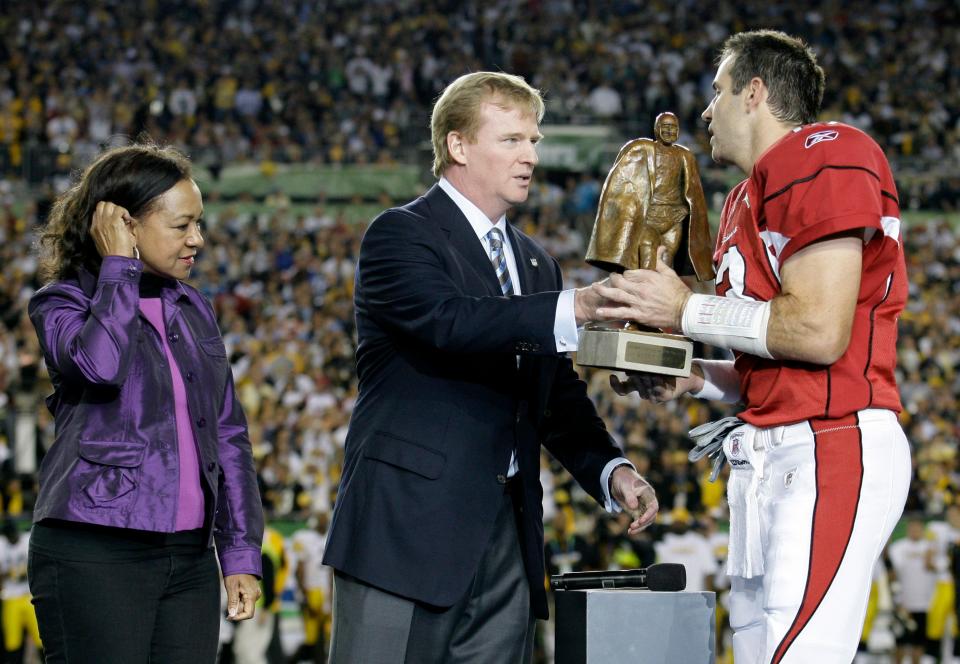
The NFL Honors award show debuted in February 2012 in Indianapolis, where it was hosted by Alec Baldwin and broadcast live on NBC. It presented the annual Associated Press awards, the Walter Payton NFL Man of the Year and the newest class of the Pro Football Hall of Fame.
“It’s like the Oscars,” said Charles Tillman, the 2013 Walter Payton Man of the Year. “After I won the award, ideas were suggested to the NFL about how we could be better. It’s good, but let’s make it a little bit better. One of the suggestions was how much money does the NFL make? Nine billion a year? And you only give $25,000 away? And this is the league’s most prestigious award? Right? We can raise that number a little bit, right?”
In 2014, the prize money for winning Walter Payton NFL Man of the Year jumped to a $50,000 donation. Finalists received $10,000.
And in the years ahead, the league continued to increase the accolade’s renown.
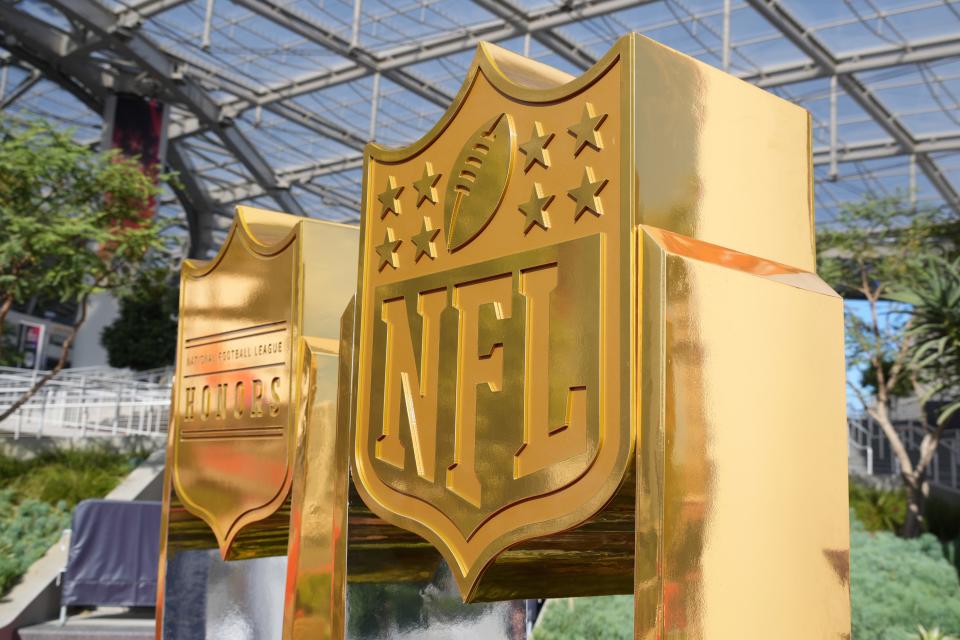
In 2015, the NFL began the Walter Payton NFL Man of the Year Charity Challenge, a social media contest based on fans’ retweets of each player’s hashtag.
The winner receives a $25,000 donation to their charity of choice, with second and third-place finishers getting $10,000 and $5,000, respectively.
“What’s funny about winning Walter Payton Man of the Year is I’ve criticized it for five years,” Andrew Whitworth, the 2021 recipient, said. “Not necessarily the actual award, but the process of going on Twitter and Instagram and promoting yourself, like ‘hashtag me to win Walter Payton Man of the Year.’ Things like that irk me a little bit because that’s not the idea of being Walter Payton Man of the Year to me. I was nominated five times, six times, and I never once tweeted that hashtag, never once asked for somebody to vote for me, ever. And I refused to. Because I just don’t think that’s what it’s about.
“I’m not here to promote the NFL when it comes to that space. You want to talk about football, my team and the league? I think it’s awesome. When it comes to charity work, it ain’t about promoting me, and so I refused to be a part of it and I never would.”
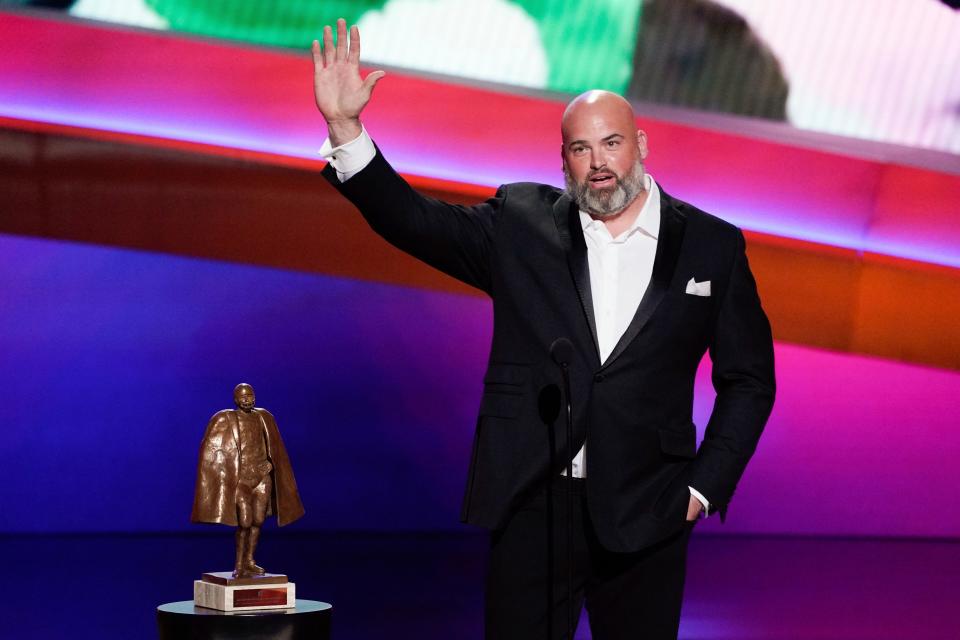
In 2017, the NFL announced that all winners of the Walter Payton NFL Man of the Year award would wear a special jersey patch depicting the Gladiator Trophy on their chests for the rest of their playing careers, and all 32 nominees each year would wear a Gladiator decal on their helmets. Later that season, for the first time, the NFL honored all 32 nominees on the field before Super Bowl 52.
“There are a lot of stories in the NFL that go untold,” Boldin said, praising the league for highlighting players’ charitable efforts, a common sentiment among those who spoke with The USA TODAY Network. “A lot of people miss how much work is being done in these communities throughout the year … but I think it goes to show how many guys in the NFL are good guys.”
The NFL’s recognition conveys fundraising power and respect and encourages players, who are ultra-competitive but not often nonprofit experts, to ramp up their community service and philanthropy to chase the honor for themselves.
“There are a lot of guys who say, ‘Man, I want your jersey. I want one with the patch on it,’ when you’re trading jerseys,” Campbell said. “You can tell the influence it has. It definitely influences more guys to do good in the community and go out there and use their platform to help the people that they’re passionate about helping.”
NFL: Teams responsible for vetting Payton nominees
The NFL goes to great lengths to promote its players’ philanthropy and community service with the Walter Payton NFL Man of the Year award, but the league does not vet the nonprofits founded by the men it honors nor educate its players on the nonprofit sector with equal effort.
“The teams vet the players,” NFL spokesperson Brian McCarthy said. “The responsibility of the teams is to make the nomination, so they would look into the players’ activities.”
Players’ marketing and public relations staff who spoke with The USA TODAY Network, however, said it’s common for teams to wait until just before nominations are due to solicit updated information about their clients’ philanthropic efforts. It is unknown how many teams, if any, review players’ nonprofit tax records as part of their vetting process.
The NFL compiles the submitted information and distributes it to a panel that chooses three finalists and the winner.
Panelists have included the current and former NFL commissioners, former winners, broadcast partners, select national football writers and the Payton family, which through a spokesperson declined to comment.
As for its philanthropic education initiatives, the NFL provided The USA TODAY Network with a four-page document titled “Starting a Player Foundation — Considerations and Helpful Tips,” which McCarthy said it distributes to all 32 teams and on the rare occasion a player approaches the league for advice.
Teams are not required to distribute the document.
Walter Payton NFL Man of the Year award winners and nominees who spoke with The USA TODAY Network had no knowledge the tip sheet existed, though each said young teammates ask them for such advice.
“It has to be more than just a TV production,” Jackie Tillman said about the Payton award. “I understand ratings and all that fun stuff but it has to go beyond that, and I think someone’s dropping the ball at some point, for sure.”
The NFL Foundation uses a third party to vet players’ nonprofits that apply for grants.
It will give larger grants to more efficient organizations, smaller grants to less efficient organizations and offers feedback to all recipients, according to NFL spokesperson Jordyn White, who focuses on the league’s positive impact in its communities; social responsibility; and diversity, equity and inclusion efforts.
“The NFL Foundation has an outside reviewer carefully vet each application and tier them based on the fiscal health of the organization, programmatic impact, strength of the application itself, etc.,” White wrote in an email to The USA TODAY Network. “The grant recipients are provided with the reviewer’s notes so they can see flagged strengths and weaknesses from their submitted applications.”
The NFL Foundation’s federal tax records reveal grants made to nonprofits using Prolanthropy’s address in Kentucky again and again and again.
‘We definitely need more education’
The NFL Players Association bestows a similar honor to the Payton award. The Alan Page Community Award recognizes a player who goes above and beyond to perform community service. It was originally presented to Starr in 1967 and was known as the Byron “Whizzer” White Award until 2018.
The five finalists for this year’s award were culled from recipients of the NFLPA’s weekly Community MVP program.
Damar Hamlin of the Buffalo Bills, Jonathan Jones of the New England Patriots, Charles Leno Jr. of the Washington Commanders, Darren Waller of the Las Vegas Raiders and Devin White of the Tampa Bay Buccaneers will each receive a $10,000 donation from the NFLPA to his nonprofit of choice.
The winner, determined by a league-wide vote of NFL players, receives $100,000.
The nonprofits founded by Waller and White are managed by Prolanthropy.
NFLPA spokesperson George Atallah said the union always stresses the importance of financial literacy, provides resources for players — including a security director who provides free background checks on people and organizations — and encourages its members to consult a registered financial adviser for guidance on the nonprofit sector.
“We are proud of the charitable work of our members and we always want to highlight the work that they are doing, especially through our Community MVP program,” Atallah wrote in an email to The USA TODAY Network. “We also encourage them at every opportunity to take advantage of the resources we have available to them, should they need them.”
Atallah said the nonprofit sector is briefly addressed during a formal rookie onboarding program the week of the annual NFLPA Collegiate Bowl, founded in 2012 and played each January at the Rose Bowl. But he confirmed there is no formal nonprofit education provided by the union to active NFL players.
The NFL ended the rookie symposium, which brought players to a central location to learn about relevant off-the-field issues, in 2016 and replaced it with mandatory rookie orientation provided by individual teams.
Topics include social responsibility, respect at work, mental health, character, values and player engagement resources, but little to nothing specific about the nonprofit sector.
“We definitely need more education out there on how to get started,” Campbell said. “Because the Walter Payton Man of the Year, it has become a big deal. And you do get a lot of resources once you win it. But there are a lot of people who have desires to win it who are trying to start from zero and they don’t know really where to begin. It’s great that guys have the desire. Now, how can we make it easier for them to go out there and do good in their communities?”
This article originally appeared on USA TODAY: Little guidance given players as NFL awards Walter Payton Man of Year

